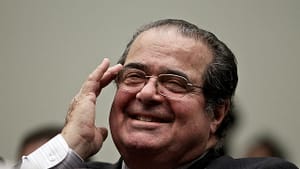Stay in the Loop
BSR publishes on a weekly schedule, with an email newsletter every Wednesday and Thursday morning. There’s no paywall, and subscribing is always free.
Justice Antonin Scalia as performance artist

When Justice Antonin Scalia found himself on the losing side of the two most important cases before the Supreme Court this term, he hurled insulting words, not at his liberal colleagues but at the conservative, Republican-appointed justices John Roberts and Anthony Kennedy.
In King v. Burwell — the Affordable Care Act case — Scalia called the Chief Justice’s words “quite absurd,” “bizarre,” “outlandish,” and “indefensible.” In Obergefell v. Hodges — the same-sex marriage case — he said that Kennedy’s majority opinion was a “threat to American democracy.”
Many observers agreed with Salon’s headline writer: “Scalia, Thomas & Alito have totally lost it: The complete and utter incoherence of the conservative Supreme Court justices.” I differ with Salon’s view. Scalia’s words were rational and precise, as always. The 79-year-old justice doesn’t seem out of his mind. Rather, in his frustration, he’s indulging in his flair for the theatrical. He is an inveterate performance artist. The man has a deep love for theater and opera. It is, in fact, the one interest he shares with Ruth Bader Ginsburg; they even appeared onstage together in Washington National Opera's production of Ariadne auf Naxos. (In fact, they are the main characters of Derrick Wang’s new one-act opera, Scalia/Ginsburg.)
Scalia knew he could sway neither his fellow judges nor neutral observers, but he felt a need to vent his passions and chose some unusually incendiary comments. Thus he said of his colleagues’ gay-marriage vote: “What really astounds is the hubris reflected in today’s judicial Putsch,” using a word normally associated with Hitler’s aggression, which led to World War II.
Unrepresentative democracy?
He went on: “A system of government that makes the People subordinate to a committee of nine unelected lawyers does not deserve to be called a democracy.” Continuing in this vein, Scalia denounced the fact that the Court contains “not a single Southwesterner or even, to tell the truth, a genuine Westerner (California does not count). Not a single evangelical Christian (a group that comprises about one quarter of Americans), or even a Protestant of any denomination.”
Scalia himself was born in New Jersey, grew up in New York City and, like the majority of the current court, is Catholic. He has degrees from Georgetown and Harvard, yet he complains that the Court lacks Protestants from America’s heartland.
I, for one, enjoy reading Scalia’s opinions. They are cleverly constructed and sometimes almost persuasive. Keep in mind my bias — I am a lifelong lover of opera, particularly Italian opera, where emotions are extroverted and over-the-top.
Let’s close with a good zinger from his marriage-equality opinion: “The Supreme Court of the United States has descended from the disciplined legal reasoning of John Marshall and Joseph Story to the mystical aphorisms of the fortune cookie.”
I don’t want that colorful writing style to be suppressed.
What, When, Where
The opinions of the Supreme Court of the United States are available online.
Sign up for our newsletter
All of the week's new articles, all in one place. Sign up for the free weekly BSR newsletters, and don't miss a conversation.
 Steve Cohen
Steve Cohen